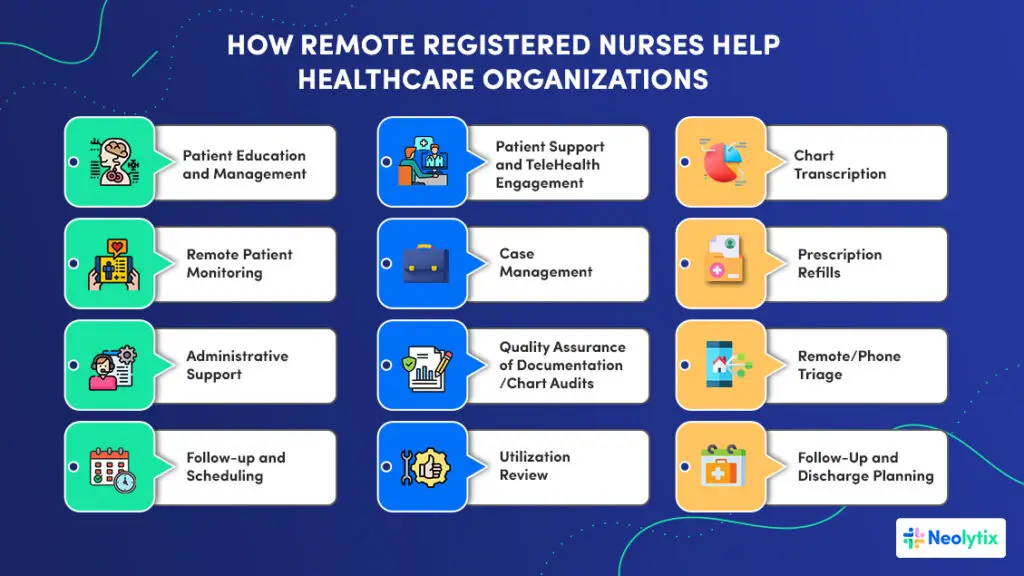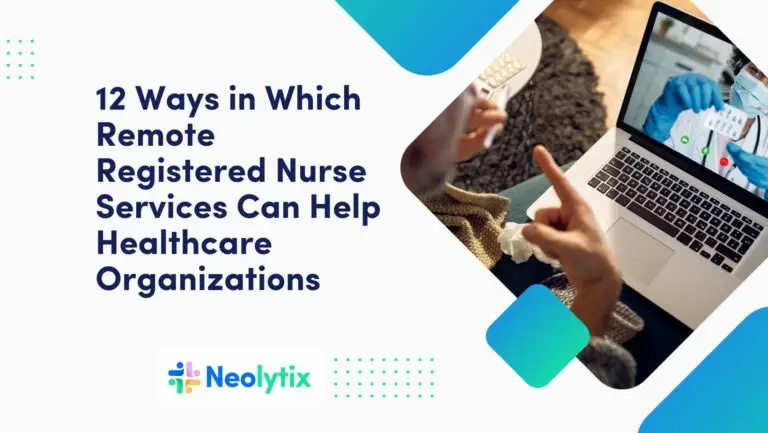With aging populations and heightened healthcare standards, nursing homes, hospitals, clinics, medical practices, etc., face increasing pressures to maintain high levels of care amidst a growing staffing crisis.
The recent U.S. News’ 2024 Best Nursing Homes ratings have highlighted this pressing issue, emphasizing the critical role of adequate staffing in ensuring the quality of care and facility success.
There’s an urgent need for innovative solutions to bolster staffing and ensure compliance with evolving healthcare mandates, and that’s where remote registered nurses come into play.

The Current Staffing Challenge
The U.S. News and the Centers for Medicare & Medicaid Services (CMS) provide different ratings that often leave healthcare leaders puzzled. While CMS uses a 5-star quality rating system focusing broadly on overall measures, U.S. News places a stronger emphasis on staffing levels, patient outcomes, and specific process measures.
This difference brings significant issues to light, particularly in staffing. For instance, recent findings indicate that 436 nursing homes did not meet the required 8 hours of registered nurse (RN) coverage on more than 20% of days. Furthermore, less than 5% of evaluated homes could meet both the existing RN rule and proposed staffing mandates.
These differences bring to light a broad and severe gap in staffing that threatens not only compliance with new regulations but also the quality of care that patients receive.
What is a Remote Registered Nurse?
In response to the acute staffing shortages faced by healthcare facilities, the role of the Remote Registered Nurse (RRN) has emerged as a crucial solution. An RRN is a certified nurse (sometimes referred to as a virtual assistant registered nurse) who operates remotely, utilizing advanced telecommunication tools to provide a range of services. This model leverages the benefits of modern technology to extend the reach and impact of nursing services without the need for physical presence in the healthcare facility.
Can a Remote Registered Nurse be located outside the United States?
Depending on the function, the short answer is yes. CMS does have stipulations on the location of healthcare providers when it comes to billing for services in certain scenarios. However, in cases where time for services is not being billed to CMS, a registered nurse can be located offshore.
As a matter of fact, it is common for many large Payers and Provider organizations to hire RNs in countries like the Philippines.
How Remote Registered Nurse Services Help Healthcare Organizations
RRNs play an integral role in the modern healthcare landscape by fulfilling several vital functions. Their involvement not only enhances the efficiency of healthcare services but also ensures that patients receive comprehensive and continuous care. Here are 12 critical roles they fulfill:
- Patient Education and Management
Remote RNs engage in comprehensive health education initiatives, providing patients with tailored information on disease prevention, lifestyle modifications, and chronic disease management. Through remote communication channels, they empower patients to make informed decisions about their health, leading to improved self-management and adherence to treatment plans. - Remote Patient Monitoring
- Leveraging telehealth technologies, remote RNs continuously monitor patients’ health status, including vital signs, symptoms, and medication adherence. This real-time monitoring enables early detection of health complications, facilitates timely interventions, and promotes proactive management of chronic conditions, ultimately reducing hospitalizations and improving patient outcomes.
Embrace the Future of Healthcare
Extend your care beyond your practice boundaries and unlock additional revenue streams
- Administrative Support
Remote RNs assist healthcare organizations with various administrative tasks, such as patient documentation, health record management, and scheduling. By ensuring accurate and efficient documentation practices, they contribute to regulatory compliance, quality assurance, and streamlined healthcare operations. - Follow-up and Scheduling
Remote registered nurses play a vital role in coordinating patient follow-ups and scheduling appointments, ensuring continuity of care and timely access to healthcare services. By proactively managing appointment schedules and facilitating communication between patients and healthcare providers, they enhance patient satisfaction and optimize resource utilization. - Patient Support and Telehealth Engagement
Through telehealth platforms, virtual registered nurses provide personalized patient support, addressing both medical and psychosocial needs. By offering empathetic guidance, emotional support, and educational resources, they foster patient engagement and empowerment, leading to improved health outcomes and enhanced patient experiences. - Case Management
Virtual RNs undertake comprehensive case management responsibilities, including member follow-ups, home care coordination, and care plan reviews. By serving as liaisons between patients, caregivers, and healthcare providers, they ensure holistic and coordinated care delivery, ultimately improving patient outcomes and satisfaction. - Quality Assurance of Documentation/Chart Audits
Remote registered nurses conduct regular audits of medical documentation to ensure accuracy, completeness, and compliance with regulatory standards. By maintaining high standards of documentation quality, they support patient safety, legal compliance, and continuity of care. - Utilization Review
They perform utilization reviews to evaluate the appropriateness and efficiency of healthcare services provided to patients. By analyzing resource utilization patterns and identifying opportunities for optimization, they help healthcare organizations achieve cost-effective care delivery while maintaining high standards of quality and patient safety. - Chart Transcription
Remote nurses transcribe physicians’ notes and patient interactions into electronic health records, ensuring accurate and accessible documentation of patient care activities. By facilitating efficient data entry and retrieval, they support seamless communication and collaboration among healthcare providers, ultimately improving care coordination and patient outcomes. - Prescription Refills
Virtual nurses manage prescription refill requests, ensuring timely and accurate medication refills for patients. By coordinating with healthcare providers and pharmacies, they help prevent medication errors, optimize medication adherence, and support continuity of care for patients with chronic conditions. - Remote/Phone Triage
Remote triage services by registered nurses, assessing patients’ symptoms and directing them to appropriate levels of care. By offering timely and accurate assessments, they help reduce unnecessary emergency department visits, optimize resource utilization, and improve patient access to care. - Follow-Up and Discharge Planning
After hospital discharge, remote RNs provide follow-up care and discharge planning services to patients, ensuring smooth transitions from hospital to home. By educating patients about their treatment plans, medication regimens, and follow-up care instructions, they promote patient safety, reduce readmission rates, and support long-term recovery.
Benefits of Hiring a Virtual Assistant Registered Nurse
Integrating remote registered nurses into healthcare operations brings a host of compelling advantages that streamline processes and elevate patient care standards. These benefits not only support healthcare facilities in managing internal resources more effectively but also enhance the overall quality of care provided to patients. Here’s a detailed look at the key benefits:
1. Reduced Workload on Site
- Delegation of Tasks
These nurses handle a wide range of routine and administrative tasks, such as patient documentation, follow-up scheduling, preliminary assessments, and chart audits for CMS compliance. This delegation reduces the administrative burden on on-site clinical staff.
2. Focus on Patient Care
With virtual registered nurses handling case management tasks, on-site nurses and physicians can dedicate more time and energy to direct patient care activities. This leads to more thorough and attentive service, enhancing overall patient outcomes.
3. Cost-Effectiveness
- Reduced Infrastructure Needs
Employing remote RNs diminishes the need for extensive physical office space and associated resources like workstations and medical equipment, leading to significant cost savings. - Operational Efficiency
The operational efficiency provided by these remote nurses helps minimize the costs associated with staffing, such as recruitment, training, and benefits typically required for additional full-time employees.
4. Scalability and Flexibility
Adjustable Workforce
Remote nurses offer a flexible staffing model that can easily be scaled up or down to match the fluctuating demands of the healthcare facility without the complexities of traditional hiring cycles.Rapid Deployment
Virtual nurses can be quickly integrated into healthcare operations, which is particularly crucial during peak times such as flu seasons or public health emergencies.
5. Improved Patient Outcomes
Continuous Monitoring
The ongoing monitoring capabilities of virtual nurses mean that patients receive consistent observation and management of their conditions, which can prevent complications and facilitate quicker interventions when necessary.Increased Patient Engagement
Regular interactions facilitated by remote nurses help in maintaining high levels of patient engagement. Educated and engaged patients are more likely to comply with treatment plans and follow-up schedules, leading to better health outcomes.
6. Enhanced Accessibility and Reach
- Extended Reach
Remote registered nurses can serve patients in remote or underserved areas where medical facilities may not be readily accessible, thus expanding the healthcare facility’s reach and impact. - 24/7 Availability
Offering services beyond standard office hours, virtual assistant nurses ensure that patients have access to care and support whenever they need it, which is particularly beneficial for managing chronic conditions, after-hours care inquiries, or triage services.
7. Data-Driven Insights
- Improved Data Management
With systematic documentation and data collection, remote nurses contribute to a richer database of patient information, facilitating advanced analytics and better decision-making. - Outcome Measurement
Continuous data collection allows for real-time monitoring of treatment outcomes, helping facilities quickly adjust strategies and protocols to improve care quality.
Implementation of VA Nursing Services into Healthcare Operations
To integrate remote registered nurses effectively into existing healthcare operations, facilities need to undertake a structured approach:
- Training and Onboarding: It is crucial that remote registered nurses are thoroughly trained in the specific protocols, software, and patient engagement techniques of the facility.
- Technological Setup: Implementing secure and HIPAA-compliant communication and data management systems to facilitate seamless interaction between remote nurses, patients, and on-site staff.
- Monitoring and Quality Control: Leveraging AI-driven analytics tools to monitor interactions and analyze performance continuously. These tools help in sentiment analysis, quality control, and provide insights into areas for improvement, ensuring that the integration of virtual registered nurses enhances the patient experience.
Summary
The staffing crisis in the USA represents a significant challenge that impacts the very core of healthcare delivery. By adopting innovative staffing solutions like remote registered nurses, healthcare organizations can address this challenge head-on, ensuring compliance with regulatory requirements and elevating the standard of care.
The integration of these virtual nurses not only supports existing staff but also introduces efficiency, scalability, and improved patient care.
Neolytix has been serving healthcare organizations nationwide with tech-driven solutions aimed at boosting revenue and efficiency for over 12 years. With our various virtual nursing options, we adapt to your organization’s needs and provide undisruptive, tailored service.
Contact us today or schedule a no-obligation demonstration to learn how our Virtual Assistant Services and remote registered nurses can help your organization thrive.
Complete the form and someone from our team will be in touch with you!



